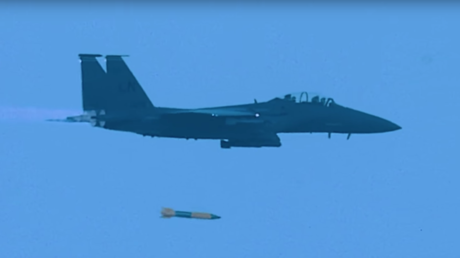US says it won't rule out nuclear first strike, because allies wouldn't trust it otherwise
Published time: 29 Mar, 2019 02:35Edited time: 29 Mar, 2019 05:42
A Pentagon official has said that the US will retain the right to carry out a nuclear strike in response to a conventional attack. A 'no-first-use' policy would erode US allies' belief that they are protected, he said.
Washington has no plans to reverse its policy of "no first use" of nukes, which means it can bomb its adversaries with nuclear weapons under "extreme circumstances," Deputy Undersecretary of Defense David Trachtenberg said in his prepared remarks to the Senate Armed Service Committee hearing on Thursday.
Trachtenberg claimed that if the US changes its take on the issue, which he described as "constructive ambiguity," it "would undermine US extended deterrence and damage the health of our alliances because it would call into question the assurance that the United States would come to the defense of allies in extreme circumstances." This uncertainty might prompt these countries to arm themselves with nuclear weapons, he said.
The hawkish Nuclear Posture Review (NPR) commissioned by President Donald Trump in 2018 lists a range of circumstances under which the US might consider striking first, such as significant strategic attacks on the US, allied or partner civilian infrastructure, forces, their command and control, as well as warning and assessment capabilities with conventional weapons.
That clause represents a major shift from the previous US nuclear doctrine, and has drawn strong criticism from Moscow, which accusedWashington of lowering the nuclear threshold and exacerbating the nuclear arms race. In addition to threatening nuclear annihilation, the review sets the stage for upgrading and expanding the already vast US nuclear arsenal. The nuclear build-up envisions developing new types of low-yield warheads that could be placed on submarine-launched ballistic missiles and on sea-launched cruise missiles.
The "mini-nuke" produced by the Pantex plant in Texas has the relatively small explosive power of around five kilotons of TNT, in an attempt to make the US deterrent more "flexible." According to some experts, it can be launched from the B-21 Raider heavy bomber, which is being developed, making a preemptive nuclear raid more of a probability.
Russia and its weapons modernization program has been singled out in the review as one of the reasons for a major build-up of the US nuclear triad. But unlike the American one, the Russian military doctrine allows the use of nukes only if under attack by weapons of mass destruction or when Russia's sovereignty is at stake.
ALSO ON RT.COMUS nukes in Europe & low strike threshold are direct violations of non-proliferation treaty – Moscow
While reinforcing its own nuclear deterrent, the US plans to spend billions of dollars upgrading its 150 B61 nuclear bombs scattered across its four European allies: Germany, Belgium, Italy, and the Netherlands – as well as Turkey.
Russia has repeatedly warned Washington that the deployment of the new bombs would violate the Non-Proliferation Treaty.
The Trump administration has already dealt a blow to weapons non-proliferation, announcing in December it would quit he Cold War-era Intermediate-Range Nuclear Forces Treaty (INF). In a mirror response, Russia halted its own participation in the pact.


0 Comments:
Post a Comment
Subscribe to Post Comments [Atom]
<< Home